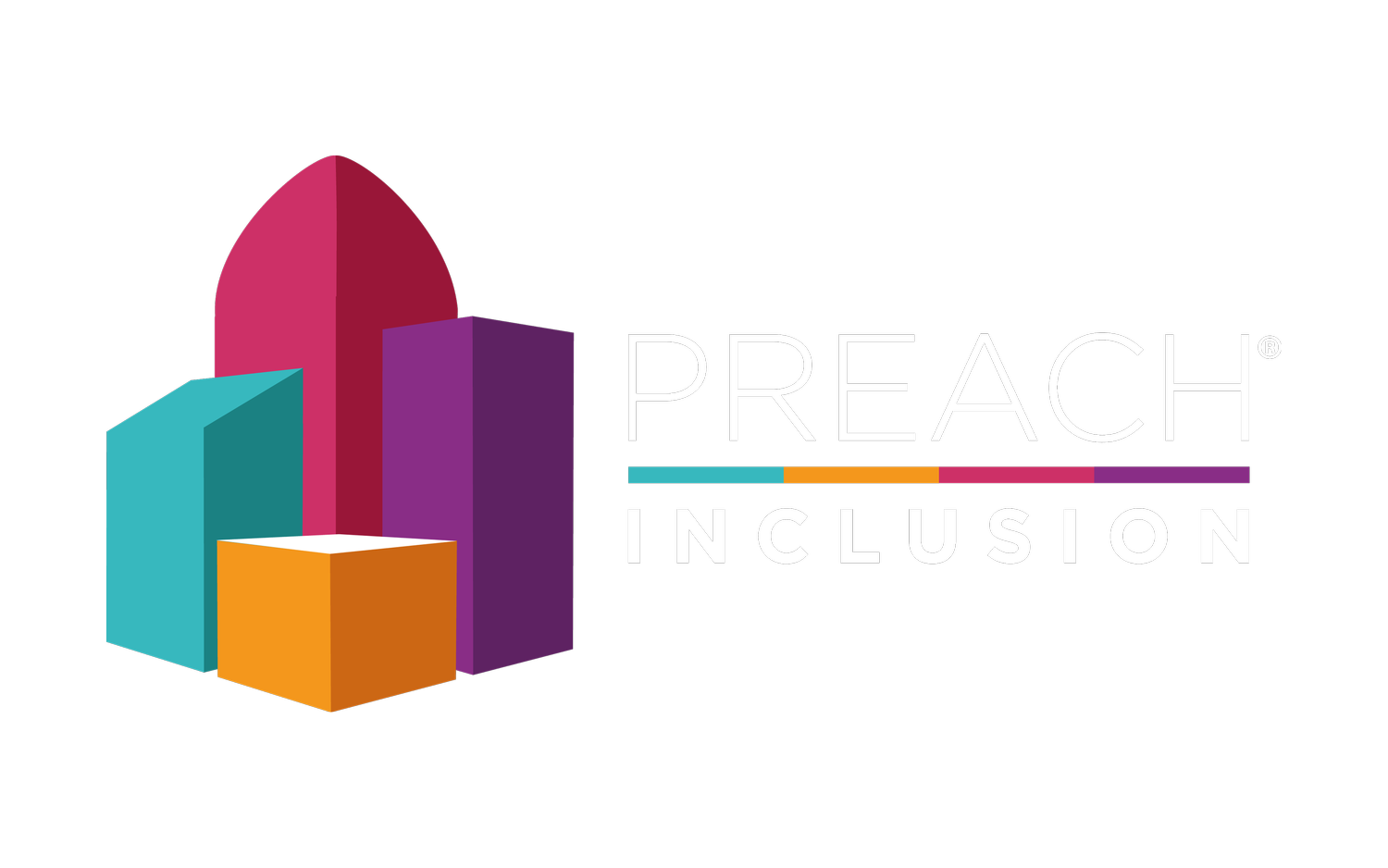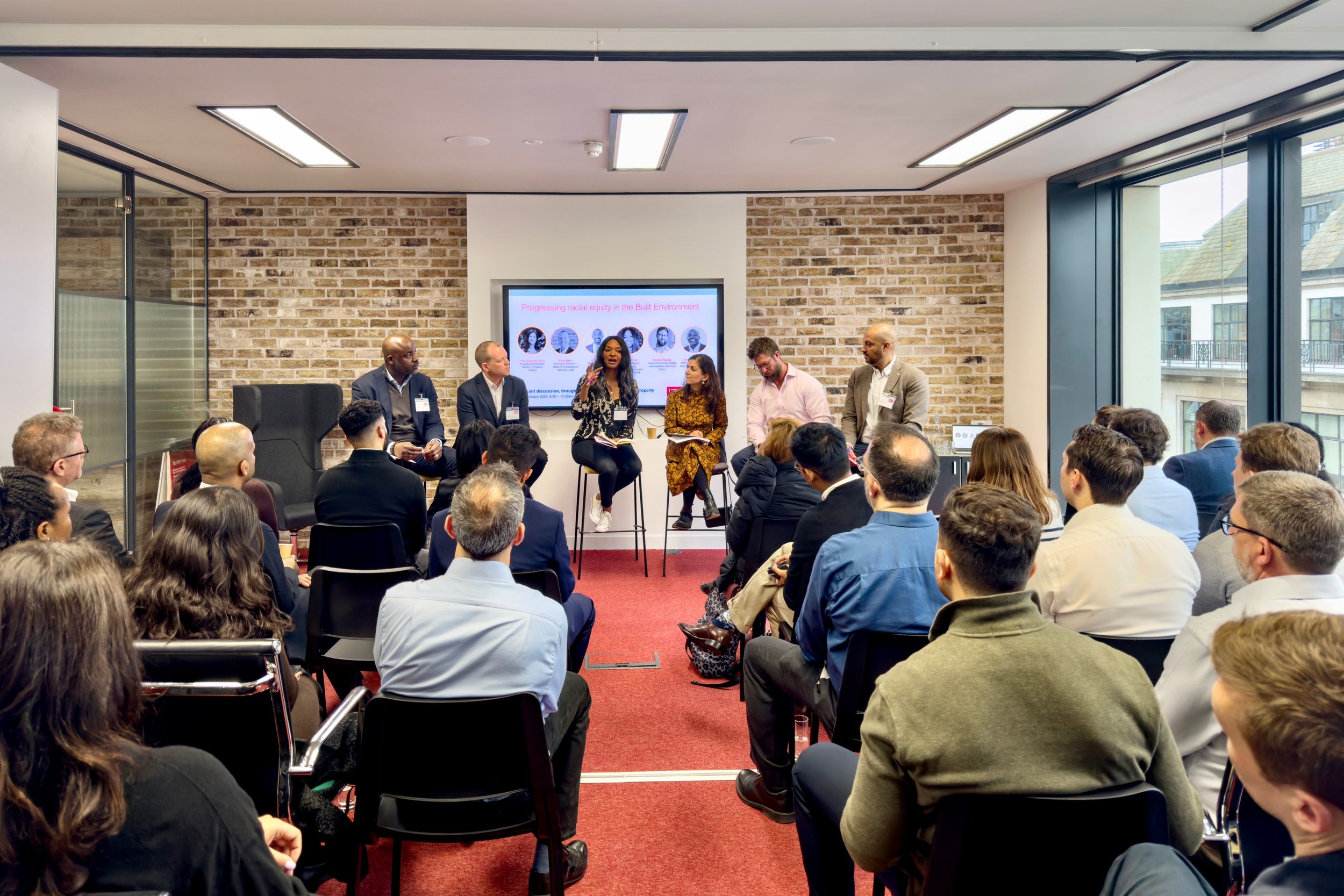Progressing racial equity in the Built Environment
By Priya Aggarwal-Shah (BAME in Property), and Donna Smith and Chris McCartney (LSH)
Please note that this article was published prior to the new brand name of PREACH Inclusion® on 25 April 2024, so you will notice references to BAME in Property.
The panel for our Racial Equity in the Built Environment discussion.
As part of Race Equality Week* (5-9 February 2024), leaders from across the Built Environment took part in an important and insightful discussion about progressing racial equity in our industry, at a joint event hosted by BAME in Property and our corporate partner, Lambert Smith Hampton (LSH) in London.
*Race Equality Week is an annual UK-wide movement uniting hundreds of thousands of organisations and individuals to address the barriers to race equality in the workplace.
From microaggressions to hindered progression, there’s no overlooking the fact that many individuals from ethnic minority backgrounds face barriers when it comes to advancing their careers.
Whether it’s lack of interesting project opportunities, less engagement with networking and extra-curricular activities that support career progression, or lack of confidence to ask for more, the general trend across the industry is that ethnic minority talent is stalling at the middle management level.
While companies have gotten better at hiring more talent from diverse backgrounds, we’re not seeing this diversity filter through to senior positions.
That is why we brought together a panel of experts to discuss these issues and provide EDI tips and guidance to our audience to implement within their own organisations.
Our esteemed panel included:
- Priya Aggarwal-Shah, Founder & Director of BAME in Property (Chair)
- Ryan Dean, Head of Transactional Services, LSH
- Alex Tross, Partner, Head of Office Agency – Midlands, Carter Jonas
- Warren Stapley, Head of Diversity, Equity and Inclusion, Montagu Evans
- Violet Pugh, Senior Manager, Marketing and Communications and Chair of the Race Network, Metropolitan Thames Valley Housing
- Nathan Lutz, Regional Technical Director, Wates Group
Bias in recruitment
Priya opened the conversation by commenting that we need to do ‘less walking, more talking’.
There is an unconscious bias towards ethnic minorities which is affecting retention of talent in the industry, particularly at more senior level positions. - Priya
Ryan stated that although he understands why ‘refer a friend’ schemes are in place, they are more likely to continue the cycle of recruiting people from similar backgrounds to the current population. We inherently have affinity bias, we are naturally drawn to people who look, think, and behave like us.
Challenges with retention
Both Nathan and Alex shared how retention is one of the biggest issues in the Built Environment industry. Nathan stated that companies need to find out why people from minority ethnic groups are leaving the business/the industry. Do they not feel comfortable? Are there barriers to psychologically safety and/or calling out bad behaviours when they occur or are experienced? Do they not feel like they have allies?
"It is much more powerful when ethnic minorities have white allies who are calling out bad behaviour." - Alex
The panel identified that it can be difficult for people from ethnic minority groups to do this themselves for fear of being deemed ‘troublemakers’.
Outreach programmes
Another important point was half hearted outreach programmes.
"It is clumsy to claim that ‘not enough diversity’ is coming through the doors, when the problem often lies with companies consistently going to the same places." - Nathan
Ryan added that we need to find ways to get school aged children more excited / interested in the built environment and as a potential career choice. By the time young people reach university age, it’s likely that we will be too late.
Priya noted that the parents of young people from minority ethnic backgrounds are more comfortable supporting their children in pursuing career paths that they are familiar with, and this quickly restricts the talent pool from these groups unless we can make the industry appealing and accessible before they are actively pursuing career paths in medicine, law, pharmacy, finance etc.
The elephant in the room
Underpinning many of the issues in our sector is the prevalence of racism. Warren called out that the western world is inherently racist as a result of the benefit and privilege that has been assumed and ingrained through colonialism.
"Delivering unconscious basis training as a way to correct behaviour is not going to cut it when there is 400+ years of deep racialised conditioning to work through." - Warren
Warren shared that he is himself a member of minority groups (being both deaf and a member of the LGBTQ+ community), but that he considers that he has never been treated as badly as those from ethnic minority populations as he still ‘benefits’ from his white ethnic heritage. His conviction was that white supremacy can only be altered when inherent racism and bias is fully deconstructed and he shared how to do this:
- There are systemic issues that we all have to think about.
- Critically appraise ourselves - to what extent have I been (or still am) complicit in racism?
- Look at it from an intersectional lens. How do we react in these situations?
How to do better:
The benefits of diversity
While it was agreed that striving for more diversity and inclusion are morally right, it was acknowledged that sometimes the only way to change attitudes is to bring the business case to the table.
"Social value is increasingly at the forefront of client considerations, particularly across the public and large corporate sectors. Through tender processes we are increasingly being asked questions about our make-up, our commitments and what we are doing in this space. There is therefore a commercial imperative to change, or we risk losing business." - Ryan
Violet added the importance of innovation through diversity, resulting in better outcomes for the communities in which we operate.
Alex boiled it down to a simple analogy:
“You have a group of physicists in a pub quiz. Most people might assume that that’s the best team to join as physicists are clearly bright. However, if a question came up about Taylor Swift, they may well not know the answer. The point being that diverse groups are better at problem solving as they have a broader range of knowledge and will be of value to a greater range of clients.” - Alex
The role of Staff Networks
One way of supporting ethnic minority employees is through staff networks, safe spaces where people from similar backgrounds can come together and share experiences.
Violet explained that staff networks are not a substitute for leadership teams in organisations applying and enacting real change through their businesses.
"The people in these groups are largely volunteers who are passionate about the cause they are representing. These groups should be considered ‘critical friends’ to the business and can be used as a sounding board, to review whether policies and initiatives are appropriate, relevant and/or fit for purpose, to call out where things aren’t working and to champion those good things that are happening across the organisation.
"These groups should also be used as another source of allyship and work alongside the HR team to drive change. Each Group should have a Senior Sponsor who actively takes part and is passionate about the aims of the group." - Violet
Quick wins
With the aim of ensuring our audience left with some actions they could take away and implement in their own organisations, our panel closed the event with their final tips:
- Nathan: Introduce reverse mentoring or early careers mentoring to get that different perspective.
- Violet: Get comfortable with the uncomfortable – seek out difference (grab a coffee with someone who is from a different ethnic background to you).
- Warren: Be a good ally – call out unacceptable behaviour and continue to examine your privilege.
- Ryan: Think about group social activities – are they too ‘white middle-aged men’ activities (i.e. drinking, sport etc).
- Alex: Don’t think that you can change it all at once, small incremental changes will eventually turn into a large change.
Thanks to our brilliant panels for sharing their insights and to our audience for actively engaging and striving to do better.
Learn more about BAME in Property and our corporate partners HERE.

